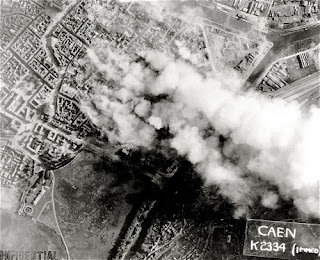D-Day.
A fateful day.
The weather was bad in France that day, or so they say. The phases of the moon, the rise and fall of the tides, and the time of day- all had to be taken into account.
So despite the weather, June 6 was the day.
Operation Overlord, code name for the Battle of Normandy that was preceded by the assault of 1200 aircraft that attacked coastal defenses so that 5000 ships and almost 160,000 British, Canadian and American troops could storm the beaches and begin to drive back the Germans.
The assault that turned the tide.
The assault that determined the course of history.
The liberation of Europe.
The Allied victory on the Western Front.
The end of the war in Europe less than a year later.
All part of the trajectory of war.
If the allies hadn't succeeded, how much longer would World War II have lasted?
How many more lives would have been lost?
How much more of the world would have been decimated?
How many more of Hitler's victims would have died?
Without D-Day, the war would have followed an alternate trajectory.
The history of the world would have taken a different path.
 |
| Lancaster bombers, D-Day |
Just as that day changed the course of history, the results of that day determined the course of my history.
My dad's log book shows three entries as part of Operation Overlord when he and his loyal crew, his good friends Doug Johnston, Burns Foster, Sig Teit, Johnny Knox, were tasked with softening the defenses. June 4 "OPS Calais. Fair Trip,Gun Emplacements." June 5 "OPS Merville. Good Trip. Gun emplacements." June 6, "OPS Coutances, Good Trip. Excellent Nav, Bridge and Highway, Diverted Colerne."
As my father's Lancaster "S for Smitty" followed its path from Middleton St. George to Caen to Colerne and back, as his plane moved through space and time, did he know the scope of the mission? Did he know that the fate of Europe hung in the balance? Or, like so many brave young Canadians, did he simply follow orders, trusting his superiors to chart his course? Or did he trust in fate or trust in God? Or did the crew start that mission, like their 29 other missions, prepared to make the ultimate sacrifice?
The odds of survival for bomber command were slim. Their first 17 missions were flown in a Halifax. In 1943 and early 1944, when my dad's crew were stationed with #419 Moose Squadron, the survival rate of a Halifax Crew surviving the 30 missions of a tour of duty were 16%, Overall, the odds of survival ran under 50%. Did Dad and his crew know what those odds were at the time? Would it have mattered? Reading his log book, in typical Dad fashion, he minimized the dangers and emphasized the good work of his crew. The simple phrase, in tiny writing, "hundreds of SL/S...holes in kite" surely downplayed an exciting trip. His entry of July 18, "coned by SL/S ...Hit by flak" is described in the Moose Squadron website in a far more dramatic fashion.
I only remember him telling us two stories of his time in the air. On one trip the crew witnessed one plane after another going down ahead of them. Defying orders, Dad veered off, surely saving himself and his crew. In another, a malfunction prevented the plane from dropping its load of bombs. But the plane, with a full tank of fuel and a full load of bombs, was too heavy to land. So they flew out over the ocean, "reduced weight" as the log puts it, and then landed safely at base with a full load of bombs. Moments that defined my Dad.
I wonder if the fact Dad and his crew survived against so many odds influenced how they lived. Did they feel lucky? Did they feel blessed? Did they feel powerful? Did they feel, on some level, that they were saved for a reason? Did they think about how the war made them into the men they would become?
If my father's plane had been shot down, he wouldn't have married my mom. I wouldn't be here. My children would never have been born.There would have been an alternate version of history. One without me in it.
How many stories begin, "It was a fateful day?" While the phases of the moon and the rise and fall of the tides may influence our trajectory, so too does every act and every accident. I think of the history of my country, the choices made by my ancestors. The acts, big and small, that influenced history. The small things we say that influence our children and our students in ways we may never know. The flick of a switch. The thrust of a throttle. Who you sat next to on a bus. A car accident. A letter. A relative stranger telling you "You're good at that." A fire. Day by fateful day, over the course of history, the course of each of our lives, one defining moment after another. Defining moments that shape you, that make you who you are. Yet it all could have taken a very different path.
Every day is a fateful day.
 |
| My dad and his grandson |

No comments:
Post a Comment
Your comment is awaiting moderation.